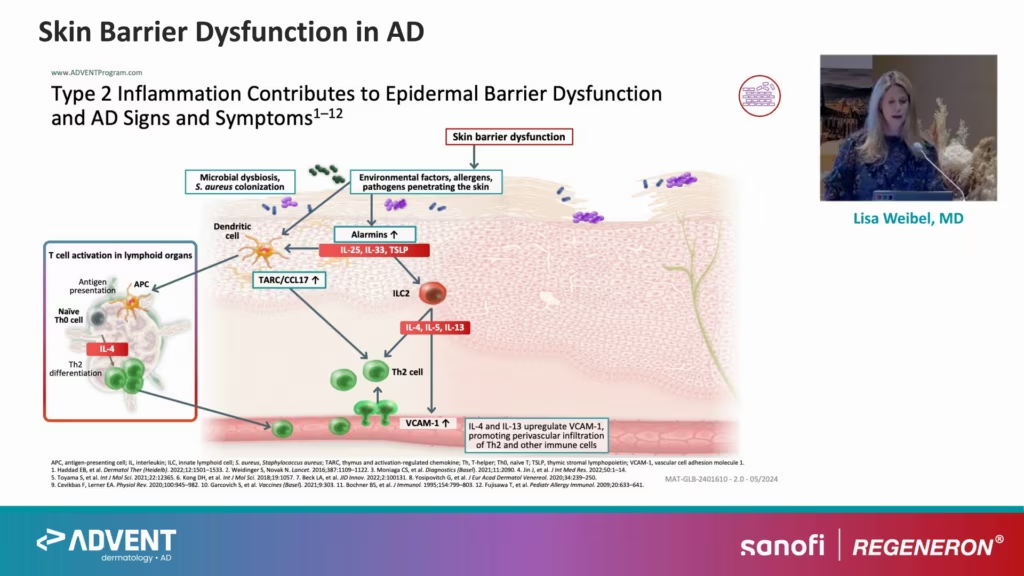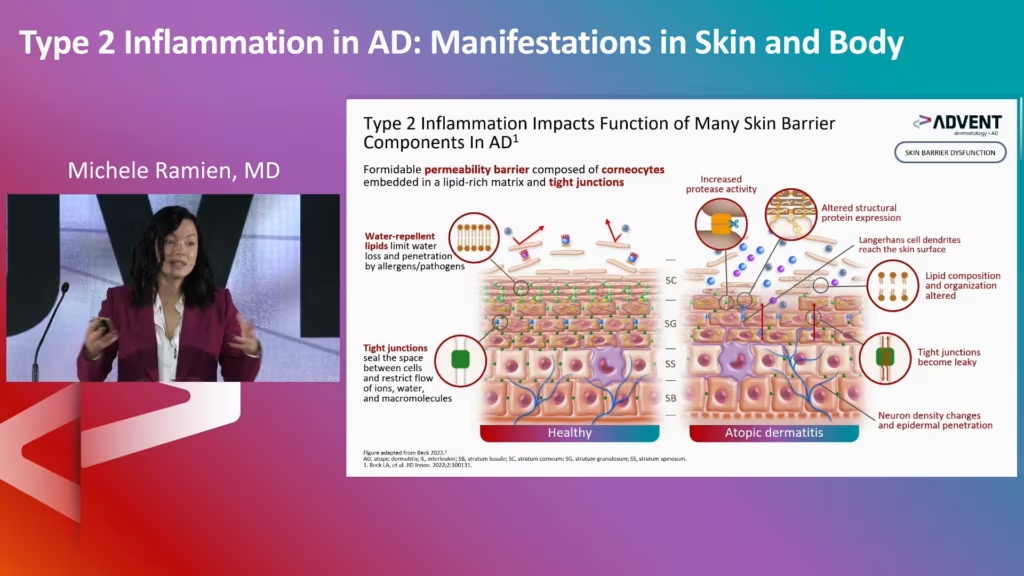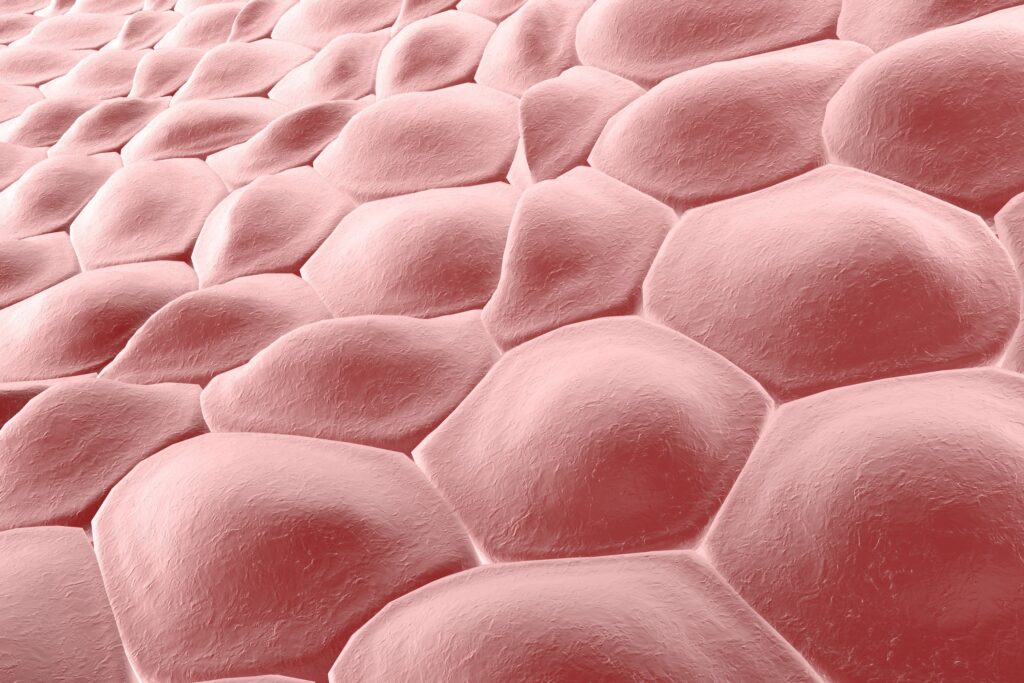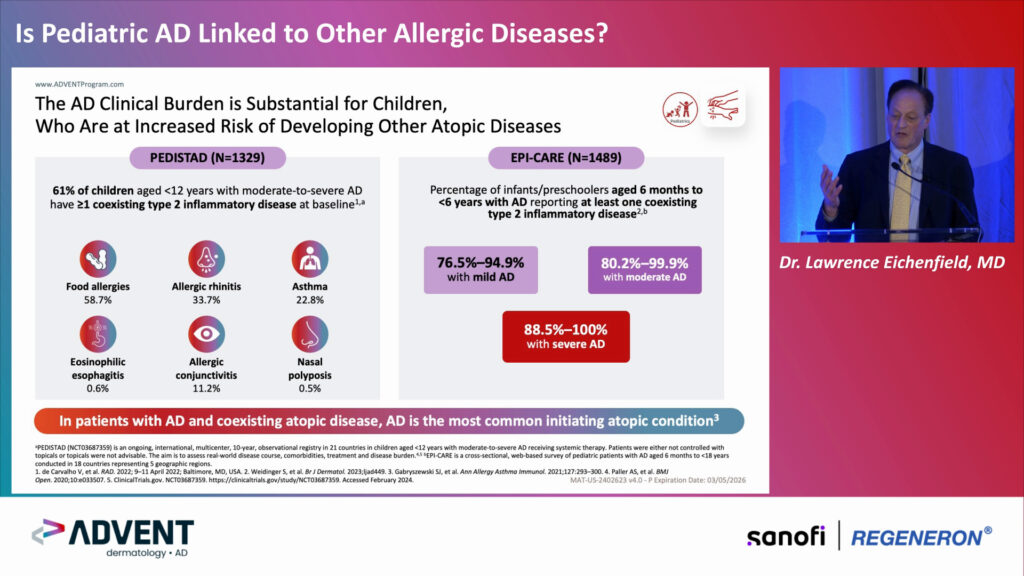Dermatitis
An Introduction to Dermatitis
Dermatitis, often referred to as eczema, is a common skin condition characterized by inflammation, itching, redness and sometimes the formation of blisters or lesions. It can vary in severity and can affect people of all ages. Dermatitis is believed to result from a combination of genetic predisposition and environmental triggers, such as allergens, irritants, changes in humidity or stress. There are several types of dermatitis, including atopic dermatitis (i.e. eczema); contact dermatitis, which is caused by direct contact with irritants or allergens; and seborrhoeic dermatitis, which affects areas with high sebum production, such as the scalp and face. The symptoms of dermatitis can range from mild to severe, impacting patients’ quality of life due to itching, discomfort and concerns relating to their appearance. The treatment of dermatitis aims to relieve symptoms and prevent flare-ups. However, identifying and addressing the underlying causes of this condition is crucial for managing it effectively. Managing dermatitis often requires a multidisciplinary approach involving dermatologists, allergists and sometimes mental health professionals due to the emotional impact that it can have on patients.
Our supporting partners do not constitute an endorsement of the content on this page.

In this episode, we speak with leading paediatric allergist Prof. Helen Brough to explore the key factors behind why some children develop allergies to foods such as peanuts, and what we can do to help prevent them. We also examine the latest developments in managing food allergies and the innovations on the horizon that could transform how we treat them.

This year, we are celebrating our inaugural touchDERMATOLOGY Future Leaders to recognize the outstanding talent that has entered our field in recent years. These individuals are set to innovate and transform dermatology in the years to come. Representing a diverse range of expertise from across the globe, these highly accomplished clinicians are among the brightest minds shaping the future of dermatology. We had the pleasure of learning about their unique career journeys, motivations, and the inspirations that have guided their paths. They also shared their perspectives on the most exciting developments in dermatology today, along with their hopes for the future of the field. Congratulations to all our touchDERMATOLOGY Future Leaders, and thank you for sharing your stories, insights and ambitions with us.

Dr Corinne Maiolo is based in Adelaide, where she treats both adult and paediatric patients, with particular interests in acne, rosacea, eczema, psoriasis, and hair loss. She is the founder of myPRODERM and was awarded the La Roche-Posay Research Grant in 2024 for her work in atopic dermatitis. In this Q&A, Dr Corinne Maiolo reflects on the moments that have shaped her career and shares her hopes for the future of dermatological care.

Physician burnout is at a critical point. In this episode, Nicky speaks with Dr Alfred Atanda about why so many physicians are burning out and what can be done to change the trend. From personal experience to system-wide solutions, Dr Atanda shares valuable insights on improving physician well-being and building a more effective healthcare culture.

Tapinarof 1% cream, a once-daily nonsteroidal topical for atopic dermatitis, is being explored for its potential to maintain skin clearance during a “drug holiday.” The ADORING 3 study investigates whether patients with atopic dermatitis can pause tapinarof 1% cream after achieving clear skin while still sustaining therapeutic benefit

Dr Raj Chovatiya presents key late-breaking data from AAD 2025 in atopic dermatitis and psoriasis, focusing on ESK001, icotrokinra, and rocatinlimab. He offers expert insights into the clinical relevance of these findings and explores what they could mean for future treatment approaches in dermatological practice.

Atopic dermatitis (AD) is a chronic inflammatory skin condition affecting approximately 10–30% of children worldwide. Early-onset AD, which often emerges by age two, is associated with a higher risk of developing other allergic diseases such as asthma and food allergies. Beyond its physical burden, AD significantly impacts patients and their families, contributing to sleep disturbances, emotional distress, financial burdens, and social challenges.

ADVENT at ESPD 2024: Type 2 Inflammation in Atopic Dermatitis and the Benefits of Early Intervention
Join experts Lisa Weibel, Amy Paller, and Eulàlia Baselga as they investigate the inflammatory processes driven by type 2 cytokines that lead to the local and systemic clinical effects of AD.

Watch leading experts discuss the pathophysiology of AD, PN, and CSU, and the concepts of AD remission and disease modification.

touchDERMATOLOGY coverage from EADV 2024: Twice-daily continuous application of ruxolitinib cream, a topical selective JAK1/JAK2 inhibitor, has been reported to be safe and effective in treating children with mild to moderate atopic dermatitis (AD) over an 8-week period in the ...

In an encouraging development for children with severe atopic dermatitis (AD), dupilumab, an interleukin-4 (IL-4) receptor alpha antagonist, has shown evidence of improving height outcomes. According to new findings presented by Prof. Alan Irvine (Trinity College Dublin, Ireland) at the 2024 ...

Treating moderate-to-severe atopic dermatitis in children and adolescents: Insights from the experts
Watch expert dermatologists discuss the management of moderate-to-severe AD in children and adolescents.









Watch highlights of two ADVENT symposia originally presented in San Diego, March 2024.

Explore some of the key insights from EADV 2023: Prof. Thierry Passeron illuminates pigmentary disorders breakthroughs, Dr Raj Chovatiya unveils atopic dermatitis innovations, Prof. Leonardo Marini sheds light on aesthetic medicine developments, and Prof. Dedee Murrell reveals treatment progress exciting clinical trials and key discoveries in blistering and autoimmune diseases. Filmed in coverage of the EADV Annual Meeting. This content was developed by Touch Medical Media and is not affiliated with the European Academy of Dermatology & Venereology (EADV) or the congress.

A-STAR is the The UK-Irish Atopic Eczema Systemic Therapy Register, an observational study investigating short and long-term safety and efficacy of systemic immuno-modulators for people with atopic dermatitis. The register also assesses the ‘real life’ cost of eczema treatments, comparing therapeutic costs with efficacy. touchDERMATOLOGY caught up with Prof. Carsten Flohr (Guy’s & St Thomas’ NHS Foundation Trust, London, UK) to discuss participants, treatments and outcome measures of the A-STAR register and the comparative efficacy and safety findings. 'Comparing the treatment effectiveness and safety of dupilumab and methotrexate in paediatric and adult atopic dermatitis: results from the A-STAR register' was presented at EADV 2023, Berlin, 11-14 October 2023 #EADVCongress. Questions What impact has dupilumab had on the treatment paradigm for atopic dermatitis since its approval? (0:12) Could you give us a brief overview of the participants, treatments and outcome measures of the A-STAR register? (0:42) What were the aims and design of your analysis of the A-STAR register? (1:09) What were the comparative efficacy and safety findings of your study? (1:57) What were the key take home messages from your study? (2:50) Disclosures: Carsten Flohr has nothing to disclose in relation to this video interview. Support: Interview and filming supported by Touch Medical Media Ltd. Interview conducted by Victoria Jones and Katey Gabrysch. Filmed in coverage of the EADV Annual Meeting. This content was developed by Touch Medical Media and is not affiliated with the European Academy of Dermatology & Venereology (EADV) or the congress.

Atopic march is a concept where the natural progression of atopic dermatitis culminates in allergies including food allergies, conjunctivitis and respiratory allergies, atopic march presents differently amongst patients and the order of progression can vary substantially. touchDERMATOLOGY were delighted to speak with Prof. Carsten Flohr (Guy’s & St Thomas’ NHS Foundation Trust, London, UK) around the progression of atopic march, the associated comorbidities, impact of early detection and prevention strategies on patient outcomes. The presentation 'Early intervention to prevent atopic march?' (Presentation ID D2T02.2A) was presented at EADV 2023, Berlin, 11-14 October 2023 #EADVCongress. Questions Could you describe the progression of atopic march? (0:11) What comorbidities are associated with atopic march? (1:19) What impact is early detection of atopic dermatitis thought to have in the prevention of atopic march? (1:56) What therapies are thought to prevent the development of atopic comorbidities? (3:21) Disclosures: Carsten Flohr has nothing to disclose in relation to this video interview. Support: Interview and filming supported by Touch Medical Media Ltd. Interview conducted by Victoria Jones and Katey Gabrysch. Filmed in coverage of the EADV Annual Meeting. This content was developed by Touch Medical Media and is not affiliated with the European Academy of Dermatology & Venereology (EADV) or the congress. Click here for more content on atopic dermatitis & for further EADV 2023 highlights visit here.

Atopic dermatitis and prurigo nodularis are type 2 inflammatory skin diseases with intense pruritis. Both share mechanisms of disease, including inflammation with the role of type 2 cytokines in driving itch. We were delighted to speak to Expert Faculty member Dr. Raj Chovatiya (Northwestern University Feinberg School of Medicine, Chicago, IL, USA) to discuss the burden of itch and its impact on quality of life, dupilumab’s recent approval and its impact on the treatment landscape. Questions Could you describe the burden of itch and the impact this has on patient quality of life? (0:17) What impact has the approval of dupilumab had on the treatment paradigm for pruritic diseases? (0:56) How do atopic dermatitis (AD) and prurigo nodularis (PN) differ in presentation, despite sharing a similar pathology? (1:29) Aside from relieving itch, what other benefits are associated with targeting IL-4 and IL-13 signalling in AD and PN? (2:13) What are the next steps to achieving disease control in inflammatory skin diseases? (2:42) Disclosures: Raj Chovatiya discloses advising, consulting, and/or speaking for AbbVie, Apogee Therapeutics, Arcutis, Argenx, ASLAN Pharmaceuticals, Beiersdorf, Boehringer Ingelheim, Bristol Myers Squibb, Cara Therapeutics, Dermavant, Eli Lilly and Company, FIDE, Galderma, Genentech, GSK, Incyte, Janssen, LEO Pharma, L’Oréal, Nektar Therapeutics, Opsidio, Pfizer Inc., Regeneron, RAPT, Sanofi, and UCB. Support: Interview and filming supported by Touch Medical Media Ltd. Interview conducted by Victoria Jones and Katey Gabrysch. Filmed in coverage of the EADV Annual Meeting. This content was developed by Touch Medical Media and is not affiliated with the European Academy of Dermatology & Venereology (EADV) or the congress.

TouchDERMATOLOGY coverage from AAD 2023: Personalised medicine utilises biomarkers to predict patient outcomes and responses to treatment, ensuring that patients get the most effective treatment quicker. We were delighted to speak to Expert Faculty member Dr. William Damsky (Yale School of ...
Latest articles videos and clinical updates - straight to your inbox
Log into your Touch Account
Earn and track your CME credits on the go, save articles for later, and follow the latest congress coverage.
Register now for FREE Access
Register for free to hear about the latest expert-led education, peer-reviewed articles, conference highlights, and innovative CME activities.
Sign up with an Email
Or use a Social Account.
This Functionality is for
Members Only
Explore the latest in medical education and stay current in your field. Create a free account to track your learning.



